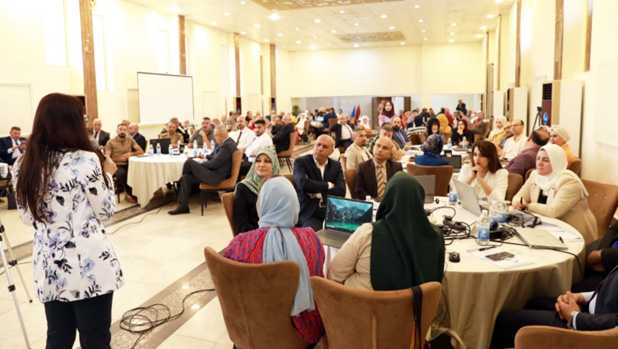 Self-assessment phase of the second round of the Joint External Evaluation in Iraq. Photo credit: WHO/WHO Iraq
Self-assessment phase of the second round of the Joint External Evaluation in Iraq. Photo credit: WHO/WHO Iraq
15 October 2023, Cairo, Egypt – In the diverse WHO Eastern Mediterranean Region, positive results have been yielded by concerted efforts to enhance health security through the monitoring and building of the International Health Regulations (IHR) core capacities.
Collaborative initiatives supported by WHO have led to notable advances in the Region’s ability to prevent, prepare for, detect and respond to public health threats. These shared efforts have also increased capacities in various technical areas critical to health security. Work that has helped to lay a solid foundation for more resilient health systems across the Region includes the adoption of the One Health approach, support for cross-border collaboration and coordination, and the strengthening of risk communication and community engagement.
The Regional Office for the Eastern Mediterranean has used the IHR Monitoring and Evaluation Framework tools to support all 22 countries and territories of the Region to complete the State Party Self-Assessment Annual Reporting on an annual basis. Twenty countries and territories of the Region have completed the Joint External Evaluation (first round), with 4 countries on track to complete the second round by the end of 2023. In addition, 19 countries and territories of the Region have developed a national action plan for health security (NAPHS), while 2 others have reviewed and updated their existing NAPHS.
These in-depth preparedness activities have both strengthened the Region’s defences against public health threats and paved the way for proposals to the Pandemic Fund. The Fund channels much-needed resources into activities to bolster pandemic prevention, preparedness and response capacities at the national and regional levels. It serves as a vital investment, especially for our Region, where NAPHS remain underfinanced. Of the 14 countries and territories of the Region that applied to the Fund in the first round of the call for proposals, the occupied Palestinian territory and Yemen succeeded in securing funding.
Other preparedness activities
Work on all-hazards emergency preparedness and response has also been ongoing in several countries. This has included efforts to strengthen public health emergency operations centres as a platform for managing health emergencies. Seven countries – the Islamic Republic of Iran, Iraq, Jordan, Qatar, Saudi Arabia, Tunisia and the United Arab Emirates ¬– are also developing their emergency medical teams, for national and international deployment in emergencies.
 A public health emergency operations center set up to monitor the FIFA World Cup Qatar 2022. Photo credit: WHO/Health Emergencies Programme
A public health emergency operations center set up to monitor the FIFA World Cup Qatar 2022. Photo credit: WHO/Health Emergencies Programme
WHO understands the challenges that countries face in trying to provide a comprehensive pathway of care during emergencies. In response, WHO has developed a comprehensive emergency care system assessment tool and has been supporting the Region’s countries and territories to assess and develop roadmaps to enhance national emergency care systems accordingly.
Readiness for mass gatherings is another important area where the Region’s expertise is increasingly appreciated as a global asset. WHO has supported countries to prepare for annual pilgrimages such as Hajj in Saudi Arabia and Arba’een in Iraq, as well as other high-profile mass gatherings like Expo 2020 Dubai, United Arab Emirates; the FIFA World Cup Qatar 2022; and the United Nations Climate Change Conference (COP27), Egypt. These initiatives have strengthened the Region’s ability to handle large-scale events and provided invaluable insights and lessons for future planning.
The commitment to preparedness extends beyond specific events. The Regional Office also supported countries to conduct all-hazards risk assessments and produce country risk profiles. These were then used to develop public health preparedness and response plans for a wide range of health threats and emergencies. From a simulation exercise in Bahrain to IHR capacity-building workshops in Somalia, these WHO-led initiatives are helping to foster a culture of preparedness across the Region.
“These results in the Eastern Mediterranean Region are a testament to the power of collaboration, dedication and a shared vision for health security,” remarked Dr Richard Brennan, WHO Regional Emergency Director. “In line with the regional Vision 2023 – which emphasizes solidarity and concerted action to achieve Health for All by All ¬– these achievements reflect the combined efforts of countries and territories and the unwavering support of the Regional Office teams. Together, we have laid a strong foundation for more resilient health systems across the Region.”


